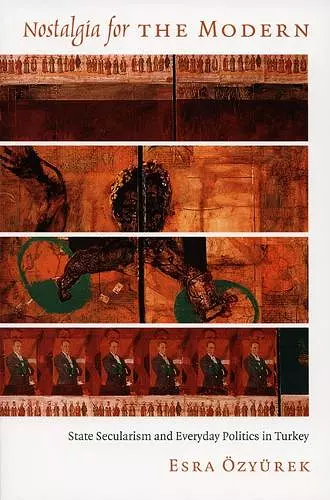Nostalgia for the Modern
State Secularism and Everyday Politics in Turkey
Format:Paperback
Publisher:Duke University Press
Published:30th Aug '06
Currently unavailable, and unfortunately no date known when it will be back

An anthropological account of how Turkey, a predominantly Muslim state, has come to embrace republicanism in a way that, as in the United States, it has suffused private domestic life.
An ethnographic analysis of the ways that, during the 1990s, Turkish citizens began to express nostalgia for the secularist and nationalist foundations of the Turkish Republic.As the twentieth century drew to a close, the unity and authority of the secularist Turkish state were challenged by the rise of political Islam and Kurdish separatism on the one hand and by the increasing demands of the European Union, the International Monetary Fund, and the World Bank on the other. While the Turkish government had long limited Islam—the religion of the overwhelming majority of its citizens—to the private sphere, it burst into the public arena in the late 1990s, becoming part of party politics. As religion became political, symbols of Kemalism—the official ideology of the Turkish Republic founded by Mustafa Kemal Atatürk in 1923—spread throughout the private sphere. In Nostalgia for the Modern, Esra Özyürek analyzes the ways that Turkish citizens began to express an attachment to—and nostalgia for—the secularist, modernist, and nationalist foundations of the Turkish Republic.
Drawing on her ethnographic research in Istanbul and Ankara during the late 1990s, Özyürek describes how ordinary Turkish citizens demonstrated their affinity for Kemalism in the ways they organized their domestic space, decorated their walls, told their life stories, and interpreted political developments. She examines the recent interest in the private lives of the founding generation of the Republic, reflects on several privately organized museum exhibits about the early Republic, and considers the proliferation in homes and businesses of pictures of Atatürk, the most potent symbol of the secular Turkish state. She also explores the organization of the 1998 celebrations marking the Republic’s seventy-fifth anniversary. Özyürek’s insights into how state ideologies spread through private and personal realms of life have implications for all societies confronting the simultaneous rise of neoliberalism and politicized religion.
“Esra Özyürek equips us to see modernity as both an ongoing invention and an object of nostalgia. Her analysis, exceptional for its ethnographic richness and ideological nuance, shows how power struggles between secular and Islamist political movements are reconfiguring popular notions of citizenship and the sacred in Turkey. Few scholars have devised such a compelling framework for assessing the mutual transformations of nationalism, Islam, and the state. This is exciting, innovative work.”—Andrew Shryock, author of Nationalism and the Genealogical Imagination
“[P]owerful, rich, and impressive. . . . The clarity of writing, together with the subtlety and sophistication of the analysis, makes this monograph unique: one that is accessible to thoughtful undergraduates and intriguing for those more engaged with anthropological theories. . .” -- Mandana E. Limbert * American Ethnologist *
“[A] fine contribution to a multidisciplinary, rich, and sophisticated discourse on contemporary Turkey. . . . The author provides us with a rich ethnography, a sophisticated and nuanced theoretical frame, and a historical perspective through which we can understand her data and conclusions.” -- Roberta Micallef * International Journal of Middle East Studies *
“The book’s main strength is its lucid presentation of the concerns of Kemalist circles in contemporary Turkey and its analysis of some of the strategies they adopted to cope with them. . . . Özyürek’s study offers fresh insights into recent political and ideological developments within the influential Kemalist circles of Turkey.” -- Amit Bein * Journal of the Royal Asiatic Society *
ISBN: 9780822338956
Dimensions: unknown
Weight: 322g
240 pages